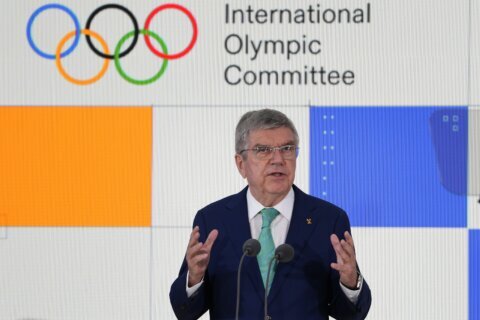Former England cricket captain Michael Vaughan was cleared by a disciplinary panel Friday of making a racist remark toward a group of Yorkshire teammates of Asian ethnicity in 2009, the latest stage of a scandal that has left a cloud over the English game.
Other former players were found, however, to have used racist or discriminatory language in a scandal that erupted when Azeem Rafiq — a former player at Yorkshire — went public in 2020 saying he had been the victim of racial harassment and bullying across two spells at English cricket’s most successful club between 2008-18.
Among his allegations, which were heard in a tearful testimony at the British parliament and led to Yorkshire losing sponsors and briefly the right to host international matches, Rafiq accused Vaughan of saying to Rafiq and other teammates of Asian ethnicity there were “too many of you lot, we need to have a word about that.” Vaughan was alleged to have made the comment on the sidelines of a Twenty20 match.
Vaughan categorically denied making the remark, and a charge against him — issued by the England and Wales Cricket Board — was dismissed when an independent commission published its findings from a hearing involving Vaughan and other Yorkshire players accused of historic racist and discriminatory remarks.
“The panel is not satisfied on the balance of probabilities that these words were spoken by MV (Michael Vaughan) at the time and in the specific circumstances alleged,” read part of an 82-page verdict covering the entire case.
Vaughan, who was captain of England’s Ashes-winning team in 2005 and is one of the most high-profile figures in English cricket, said on Twitter the last few years have been an “incredibly difficult period in my life.”
“At times, this process has brought me to the brink of falling out of love with cricket,” he wrote, adding that he hopes “an inclusive healing process can now begin” for English cricket.
Yorkshire launched an investigation in 2020 in the wake of Rafiq’s allegations of what he called “institutional racism” at the club that left him feeling suicidal. Yorkshire, a team in the north of England which is a record 33-time winner of the county championship, later apologized that Rafiq was the victim of “racial harassment and bullying.”
Seven of Rafiq’s 43 claims were upheld in a report commissioned by Yorkshire, but the full version of the report was not published and didn’t lead to any of the club’s hierarchy facing disciplinary action.
As a result, the ECB chose to issue disrepute charges against seven individuals — including Vaughan — with prior connections to Yorkshire Cricket Club. The club was also charged.
Vaughan was the only individual to appear in person at the Cricket Discipline Commission hearing in London that began in early March.
In his statement Friday, Vaughan said the verdict “must not be allowed to detract from the core message that there can be no place for racism in the game of cricket, or in society generally.”
And the CDC said the findings “do not in any way undermine the wider assertions made by” Rafiq, “many of which of course have been confirmed by the admissions of both YCCC (Yorkshire) and certain individuals.”
That was reflected by the panel upholding some of the charges issued by the ECB against the other former Yorkshire players who were accused of using racist and/or discriminatory language during their time at the club — Tim Bresnan, Matthew Hoggard, Andrew Gale, Richard Pyrah and John Blain. They were found liable for a breach of an ECB directive, regarding conduct prejudicial to the interests of cricket and bringing the game into disrepute, and have 14 days to appeal the CDC decision.
Another, former England batter Gary Ballance, previously admitted to the charges against him.
Sanctions will be handed down at a later date.
In a Twitter post reacting to the panel’s findings, Rafiq underlined that charges against seven of the eight defendants were upheld and that previous inquiries have found he was the subject of bullying and racial harassment at Yorkshire.
“The issue has never been about individuals but the game as a whole,” he wrote. “Cricket needs to understand the extent of its problems and address them.
“Hopefully the structures of the game can now be rebuilt and institutionalized racism ended for good. It’s time to reflect, learn and implement change.”
The scandal led to a huge amount of soul-searching in English cricket — primarily about its record on inclusivity and its locker-room culture — and huge change in the leadership of Yorkshire.
After a series of reforms and the replacement of individuals in key roles at the club, it got reinstated as an international venue.
The ECB created an anti-discrimination unit in the wake of the scandal, conducted a review of dressing-room culture across England men’s and women’s teams and made a financial commitment of 25 million pounds (then $33.3 million) over five years to support actions improving equality, diversity and inclusion. Improving boardroom diversity was one of the goals, along with helping people from diverse backgrounds progress into professional teams.
ECB chairman Richard Thompson said Rafiq had “exposed a side of our game which no one should have to experience.”
“Given the nature of these cases,” Thompson said, “they have taken a clear toll on everyone involved. There now needs to be a time of reconciliation where, as a game, we can collectively learn and heal the wounds and ensure that nothing like this can ever happen again.” ___
More AP cricket: https://apnews.com/hub/cricket and https://twitter.com/AP_Sports
Copyright © 2024 The Associated Press. All rights reserved. This material may not be published, broadcast, written or redistributed.







